- Role of Blockchain in Aviation Industry
- Use Cases of Blockchain in Airlines
- 1. Collects and Stores Data
- 2. Saves Cost on Maintenance
- 3. Implements Smart Tickets Concept
- 4. Verifies Users’ Identity
- 5. Improves Digital Travel Experience
- Blockchain Benefits for the Aviation Sector
- 1. Automates Payment Processes
- 2. Improves Customer Experience
- 3. Reduces Dependency on Third Parties
- 4. Improves Aircraft Lifecycles
- 5. Streamlines Ground Operations
- Multi-Stakeholder Collaboration & Supply Chain Transparency
- Multi-Stakeholder Collaboration
- Supply Chain Transparency
- Blockchain in Action: Real-World Aviation Case Studies
- Aircraft Part Tracking and Maintenance: AFI KLM E&M and Parker Aerospace
- Ticketing and Booking: Hahn Air & Winding Tree
- Airport Operations and Air Cargo Efficiency: VIRTUA Project
- Challenges for Blockchain in the Aviation Industry: With Respective Solutions
- Interoperability and Standardization
- Scalability and Performance
- Legacy System Integration & High Implementation Costs
- Data Privacy & Confidentiality
- Experience the Revolution of Blockchain in Airlines with Appinventiv
- FAQs
- Q. What are the regulatory and compliance implications of using blockchain in aviation?
- Q. How can blockchain improve the customer experience in air travel?
- Q. Which airlines or aviation companies are using blockchain?
- Q. What is the future outlook for blockchain in the aviation industry?
- Q. What challenges or barriers exist for blockchain adoption in aviation?
- Q. What are smart contracts, and how are they used in aviation?
- Q. What are the benefits of blockchain for airline payments and settlements?
- Q. How does blockchain help with aircraft parts tracking and maintenance logs?
Key takeaways:
- Aviation companies are beginning to utilize blockchain technology to address some of their most significant challenges. When planes need maintenance, mechanics can now store repair records in a system that can’t be tampered with – no more lost paperwork or questions about whether work was actually done.
- The real game-changer is how blockchain handles payments and bookings. Instead of waiting days for transactions to clear between airlines and travel agencies, smart contracts process everything automatically.
- Airlines used to struggle with counterfeit parts – a serious safety risk. Now they can trace every component back to its manufacturer and verify it’s legitimate.
- Many airlines still operate on decades-old computer systems that are incompatible with blockchain. Getting everything to work together takes time and money. However, industry analysts predict that the market will reach around $1.5 billion by 2030 as more companies make the switch.
Everyone’s talking about blockchain these days, and honestly, it’s hard to escape the hype. But when you look at aviation specifically, there’s actually something real happening here. The aviation world has always been incredibly complex – you’ve got safety regulations coming from every direction, maintenance records that need to be perfect, and supply chains that span the globe. So, when someone asks about the role of blockchain technology in the aviation industry’s transformation, it’s worth taking a serious look.
Here’s the thing about how can blockchain improve safety and security in aviation – this isn’t just theoretical anymore. Airlines are drowning in paperwork, stuck with departments that might as well be speaking different languages, and working with supply chains where you’re crossing your fingers that the engine part you ordered isn’t some knockoff made in someone’s garage. The old systems were never designed for this kind of mess, especially when you absolutely need to know where everything comes from and be able to trace it back if something goes wrong.
What’s fascinating about blockchain in aviation is how it creates this shared ledger that nobody can mess with after the fact. Think about it – when a mechanic services an aircraft, that record goes into the blockchain immediately. The airline, the manufacturer, and the regulators are all aware of it. No more “the dog ate my maintenance logs” scenarios.
Let’s examine the role of blockchain technology in aviation industry transformation and how it’s reshaping operations.
Role of Blockchain in Aviation Industry
Blockchain is revolutionizing aviation in numerous ways. The key aspect is that once something is recorded, nobody can alter it or change it after the fact. This is huge for aviation because you absolutely need your data to be rock-solid and trustworthy – there’s no room for guesswork when people’s lives are on the line. It’s why blockchain technology in aviation sector operations, which rely heavily on data integrity, could take great advantage of the latest technological trends.
According to Lucintel, blockchain in aviation market research shows rapid growth potential, reaching an estimated $1.5 billion by 2030 with a 20.4% CAGR from 2024 to 2030. Key areas driving innovation include passenger identity, cargo tracking, flight data, smart contracts, and blockchain aviation maintenance solutions. Airlines will remain the largest end users of blockchain in airlines applications, while aircraft maintenance leads technical implementations. North America’s probably going to see the biggest jump in growth because they’re quick to adopt new tech and have all the major aviation companies based there. It’s setting up a future where the use of blockchain in aviation brings way more transparency, smoother operations, and a better experience for passengers flying around. [Source: Lucintel]
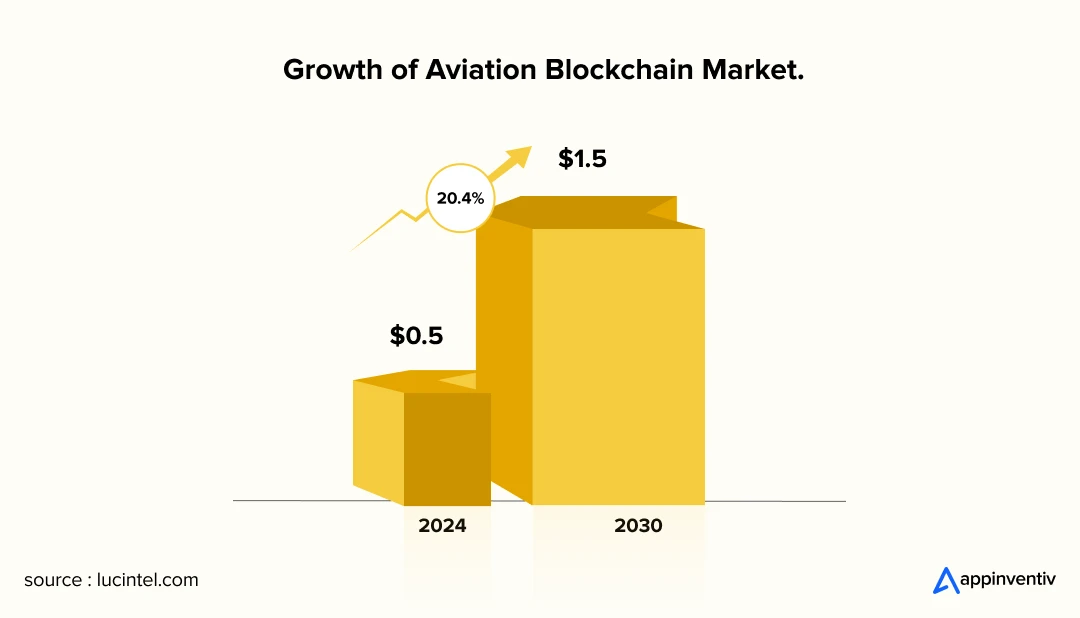
In straightforward terms, blockchain technology in aviation sector implementations provides a streamlined system for the quick distribution of income, reducing overall expenses and eliminating potential delays due to revenue-sharing conflicts. By creating a single system that employs specified criteria, blockchain technology facilitates flights to remain on schedule and avoid costly delays. So, blockchain in airlines can greatly benefit aircraft managers, airlines, and passengers alike.
Let’s dive deep into the basic features and fundamentals of blockchain:
Overall, with its potential to provide real-world benefits and a seamless travel experience, blockchain technology in aviation is becoming increasingly popular and widely adopted.
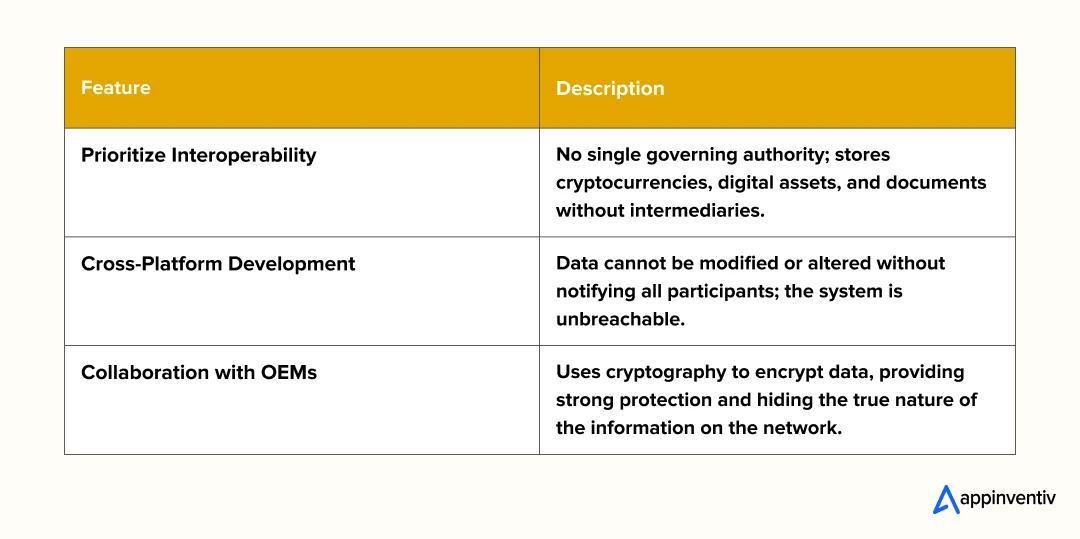
Discover More: On-Demand Aircraft: The Future of the Aviation Industry
To understand the role of blockchain technology in aviation industry modernization, we must examine its practical applications across different operational areas.
Use Cases of Blockchain in Airlines
Blockchain could significantly transform the way the aviation industry operates. Airlines and airports are finding that it helps them run more smoothly, save money, and maintain a higher level of security. The following use cases demonstrate how blockchain in aviation industry is creating tangible value across multiple operational areas:

1. Collects and Stores Data
When Malaysia Airlines Flight MH370 disappeared in March 2014, it really showed how outdated our flight tracking was. The plane just went off course and vanished, leaving investigators with basically nothing to work with. They couldn’t figure out why the pilot changed direction or what actually happened. Despite burning through hundreds of millions on search efforts, we still don’t know what went down that night.
That whole mess got people wondering how to stop these kinds of mysteries. If every move and system change on MH370 had been locked into an unchangeable record that everyone could see in real-time, investigators wouldn’t have been left guessing months later. The disaster exposed how outdated aviation tracking really was back then.
Blockchain in aviation systems can totally flip how we keep tabs on aircraft by creating records that nobody can alter once they’re made, and they update in real-time with critical flight info. Getting a handle on blockchain for flight tracking shows how this tech lets you securely document all the important stuff – exact flight routes, passenger lists, cargo info, baggage handling details, and where the plane actually is at any given moment. Such comprehensive data collection ensures that investigators would have immediate access to detailed flight information during emergencies.
Another thing – blockchain doesn’t keep everything in one place like those old databases that hackers love to hit. Instead, it spreads flight info across multiple secure spots, so your data stays solid while everyone can still see what they need to see. You end up with tons of backup copies scattered around, which means there’s basically no way for critical flight records to just disappear or get trashed. It’s like having your important stuff stored in twenty different safe deposit boxes instead of just one that someone could break into.
2. Saves Cost on Maintenance
Flight delays caused by maintenance issues are a familiar frustration that blockchain aviation maintenance systems are designed to eliminate, creating cascading effects that extend far beyond passenger inconvenience. These operational headaches really damage airline reputations while creating massive financial hits from missed connections, crew overtime costs, passenger compensation, and repositioning aircraft. The aviation world has been looking more and more at blockchain technology in aviation as a game-changing fix for maintenance management, with incredible possibilities for cutting costs and making operations run smoother.
How Blockchain Revolutionizes Aviation Maintenance:
- Real-Time Component Monitoring – Blockchain tracks how aircraft parts are doing as things happen, not just during scheduled checks. Maintenance crews don’t have to poke around everywhere hoping to find issues – they already know which specific components are acting up. This cuts down on all that time spent doing broad inspections when you could be fixing the actual problem.
- Enhanced Operational Efficiency – Blockchain aviation maintenance systems make it easy to update all maintenance records in real-time using distributed ledger tech. This constant data sync boosts how efficiently everything runs while getting the most out of each aircraft, keeping planes in the air making money instead of sitting in hangars for maintenance checks they don’t actually need.
- Predictive Maintenance Capabilities – Smart blockchain setups look at how parts have behaved over time to spot trouble before it actually hits. Airlines can fix stuff during planned maintenance windows instead of dealing with surprise breakdowns that mess up flight schedules and leave passengers stranded. It’s way better to catch problems early when you have time to handle them properly rather than scrambling to fix things when a plane’s supposed to be taking off.
3. Implements Smart Tickets Concept
Picture having one secure digital key, backed by blockchain, that handles your entire air travel experience. This smart ticket idea shows what blockchain in aviation can do in 2025, moving us way past those old paper tickets into something way more convenient and efficient. These digital tickets live on a blockchain that can’t be messed with, and they don’t just get you on the plane – they also get you into airport lounges, speed up hotel check-ins, and connect with your loyalty programs to hook you up with personalized travel benefits.
Additionally, storing smart tickets on a blockchain could help mitigate or eliminate the effects of chaos that can cause a crash in an airline’s or airport’s centralized ticketing database. Such asset tokenization will also evolve the booking system by eliminating the need for alternate forms of identification.
4. Verifies Users’ Identity
The airline industry faces significant security risks when individuals use fake IDs to bypass checkpoints. This creates scary situations where criminals could potentially pull off attacks or other illegal stuff at airports and on planes. To fight this serious threat, blockchain technology in aviation gives you a solid way to verify identities, especially when you combine it with biometric systems.
Once a user’s identity is verified via biometric scans (e.g., fingerprints, facial recognition, iris scans), this immutable record is securely logged on a decentralized blockchain. This spread-out ledger system keeps all the data solid and makes it basically impossible for anyone to mess with or change it. This shows how can blockchain improve safety and security in aviation by cutting way down on mistakes that happen when people have to manually check IDs, and it opens the door for biometric systems that can identify passengers automatically.
Below is a table of technical standpoints involved:
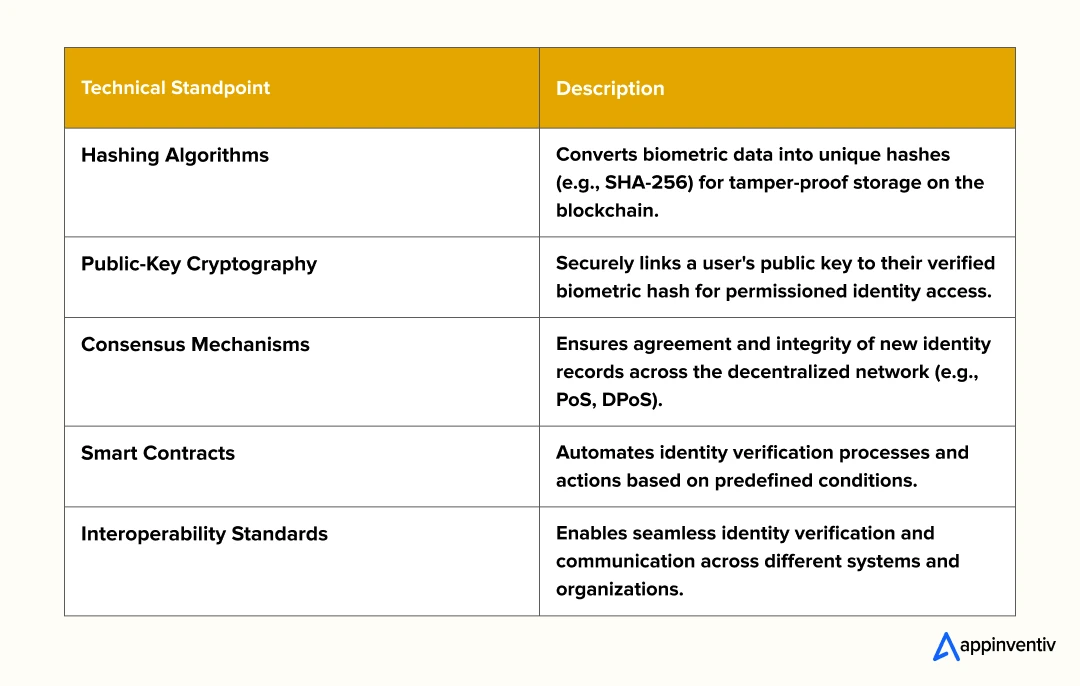
5. Improves Digital Travel Experience
Ever tried booking a trip and felt like you were playing some kind of puzzle game? You’re on one site for flights, another for hotels, then bouncing around looking for car rentals or airport shuttles. Well, turns out all that jumping around isn’t just annoying for travelers – it’s costing travel companies serious money. When everything’s scattered like that, booking companies can end up losing around $269,000 just from all the inefficiency and headaches it creates. That’s real money getting flushed down the drain because nobody’s figured out how to make the whole process work together properly.
But here’s where blockchain technology swoops in like a superhero. Imagine a world where all those separate pieces – airlines, ticketing, loyalty programs, even ground transportation and hotels – could all talk to each other on one unified system. That’s what blockchain technology in aviation sector promises for airline operations and the broader travel ecosystem. It can streamline everything, creating a truly seamless travel experience that benefits everyone.
In short, the use of blockchain in aviation applications across multiple operational areas will be a game-changer!
Also Read: How an aviation Departure Control System optimizes costs
Blockchain Benefits for the Aviation Sector
Aviation’s been stuck with these old, clunky systems where different parts of the industry can’t talk to each other properly. Airlines, airports, manufacturers, regulators – they’re all working with their own separate setups that don’t play nice together. When something needs to get shared quickly, it becomes this whole ordeal of phone calls, emails, and paperwork that slows everything down.
That’s where blockchain comes in and actually makes sense for once. Rather than everyone being stuck with their own separate systems, you end up with this connected network where info moves smoothly between all the different companies. Businesses can grab what they need quicker, roll with changes better, and it won’t break the bank to get it done. When everybody’s using the same solid information, you start coming up with fresh business ideas that nobody had considered before. It’s actually one of those times when the tech fixes real headaches instead of making things worse.

Let’s dig deeper to understand how blockchain in aviation industry provides transformative benefits:
1. Automates Payment Processes
When airlines use blockchain for payments, travelers don’t have to worry as much about their credit card info getting stolen or misused. The whole system takes care of boring stuff automatically – like adding those travel insurance charges, updating your miles, and dealing with all the government fees that usually slow things down. Your payment goes through quicker and you’re not sitting there wondering if someone’s going to mess with your financial details. It’s just cleaner and faster than the current mess of payment systems most airlines still use.
2. Improves Customer Experience
Blockchain tech in airlines can really boost the customer experience too. When passengers get real-time flight updates, digital tickets, and electronic record keeping, blockchain benefits for aviation include better transparency, rock-solid data, and happier customers overall. It makes everything simpler and cuts down on screw-ups that usually frustrate travelers.
3. Reduces Dependency on Third Parties
Can you believe that travel agents and middlemen handle about 99% of tickets that aren’t sold directly by airlines? All those booking fees and commissions really add up, and guess who ends up paying for it in the end? Blockchain could shake things up by cutting out some of these middlemen or at least making their cut smaller. When airlines don’t have to pay as much to third parties, they keep more money for themselves and maybe even pass some savings on to passengers.
4. Improves Aircraft Lifecycles
Ever think about all the stuff an airplane goes through during its life? With blockchain, airlines can track every single thing that happens to a plane – from when it rolls off the assembly line to every tiny repair job it gets. It’s basically like having a diary that nobody can mess with, recording what happened to the aircraft and all its parts.
When all that detailed info is right there, it becomes way simpler to handle everything and verify parts are real instead of sketchy knockoffs. Maintenance teams can knock out their jobs faster and do them right because they’ve got the whole history of whatever they’re fixing. This stops expensive delays from screwing things up, and everybody can relax knowing they’ve got the full story on every component bolted to that aircraft.
5. Streamlines Ground Operations
When airlines jump on blockchain, their costs drop, operations flow better, efficiency goes up, and security gets tighter. Tracking and tracing becomes crystal clear – no more wondering where stuff is or what’s going on. Those nightmare processes that used to drive everyone crazy? They become straightforward and actually function like they should. It’s like taking all the chaotic, broken pieces of airline management and finally getting them to click together the way they were supposed to all along.
All in all, blockchain benefits for aviation are transforming the industry, providing airlines with secure, efficient, and cost-effective operational management capabilities.
You Might Like: Transforming the travel value chain with Blockchain
Multi-Stakeholder Collaboration & Supply Chain Transparency
Blockchain technology in aviation brings a game-changing fix by building a shared, unchangeable record system that lets all aviation players work together smoothly while giving total transparency across the supply chain. This spread-out approach shows what are the main applications of blockchain in aviation by completely changing how the industry handles everything from daily operations to tricky regulatory stuff, building a more efficient, secure, and reliable aviation world. But the challenge of blockchain in aviation industry comes down to getting all these different stakeholders and old systems to work together under one decentralized setup, which needs everyone to cooperate on governance and agree on standard protocols.
Multi-Stakeholder Collaboration
Picture the aviation world like this massive, complicated jigsaw puzzle made up of tons of different pieces: airlines, plane makers, parts suppliers, maintenance teams, ground crews, and to explain what is the blockchain technology in airports, airport operators, regulators, and air traffic control systems. Traditionally, all these different “players” work in their own little bubbles, using their own separate systems and databases. This creates a lot of friction, delays, and people talking past each other.
Blockchain flips this whole thing on its head. It builds a shared, secure, and see-through digital record that everyone can access and add to (with the right permissions, obviously!). Picture it like a universal, bulletproof logbook. When one player adds info – like when an airline logs a maintenance update – it shows up instantly for all the other relevant folks to see and verify. This creates:
- Trust and getting on the same page: When everybody’s looking at the same info, there’s way less arguing about what really went down, and teams can actually work together without all the drama.
- Smoother operations: No more endless email chains or hunting people down for information. It’s all right there, updated in real-time.
- Better choices: With the full, accurate picture of what’s happening, everyone can make smarter decisions about flight schedules, where to put resources, or safety procedures.
Supply Chain Transparency
Putting together and keeping planes running involves juggling thousands of different components from suppliers all over the planet. It’s an absolute mess trying to track all that gear. Fake parts slip through the cracks, quality checks get half-assed, and frankly, nobody has a clue what’s really happening across the entire supply chain. You wind up with this crazy mess where vital aircraft parts might be coming from anywhere, and there’s no reliable way to double-check if they’re legit or just expensive junk.
Blockchain in aviation brings crazy transparency to this supply chain. Every single move a part makes, from where the raw materials came from to manufacturing, testing, shipping, getting bolted onto a plane, and even when it finally gets scrapped, can all be logged on the blockchain. This builds an unchangeable “digital birth certificate” for every single piece. This means:
- Real deal guaranteed: You can instantly check where any part came from and if it’s legit, massively cutting the chances of dangerous fake components getting onto aircraft.
- Full tracking: If something goes wrong with a part, you can trace its whole life story in seconds, figuring out exactly where and when things went sideways.
- Better safety and rule-following: Regulators and maintenance folks have a complete, rock-solid record of every component’s background, making inspections easier and keeping safety standards sky-high.
- More efficiency: Way less time wasted on paperwork, manual checking, and hunting down info, which saves serious money and speeds everything up.
These case studies demonstrate the role of blockchain technology in aviation industry evolution from theoretical concept to practical implementation.
Blockchain in Action: Real-World Aviation Case Studies
These real-world examples showcase successful blockchain in aviation industry implementations. These practical use cases provide a solid base for the effect of blockchain integration in the aviation sector:
Aircraft Part Tracking and Maintenance: AFI KLM E&M and Parker Aerospace
What they did: Air France Industries KLM Engineering & Maintenance teamed up with Parker Aerospace Group and SkyThread to set up a blockchain system that tracks aircraft parts from the moment they’re made all the way through their entire life cycle. They’re focusing on Boeing 787 fleets and pumping in data for millions of part events – everything from when a component gets manufactured to when it’s installed, taken out, fixed, or moved around. It’s a pretty massive undertaking when you think about how many parts go into keeping those planes flying.
The Impact: This collaboration is totally reshaping how companies handle aircraft parts. Now they can see exactly where every piece comes from and follow its path through the whole system. It’s way easier to tell real parts from fakes, which keeps bogus components from slipping through. Plus, when maintenance crews need to work on something, they can instantly check the complete background of each part, so repairs get done faster and the whole supply chain runs smoother. [Source: Aviation Business News]
Ticketing and Booking: Hahn Air & Winding Tree
What they did: Hahn Air, a German airline, was the first to actually issue a real ticket using Winding Tree’s blockchain platform – which is basically an open-source travel marketplace. This lets them put their available seats out there, handle bookings, and get paid directly without having to go through all the usual middlemen. It’s pretty cool because they can cut out a lot of the traditional booking agents and travel sites that normally take their cut of every sale.
The impact: This partnership proves how blockchain might flip travel booking on its head. Rather than dealing with a bunch of intermediaries, airlines and travelers can work together more directly, or use independent agents who aren’t locked into those big booking monopolies. You end up with cheaper prices all around, no sneaky fees hiding in the fine print, and payments that actually go through fast without all the usual hassles. It’s pushing the whole industry toward something that actually makes sense for both people buying tickets and the airlines selling them. [Source: Business Travel News Europe]
Airport Operations and Air Cargo Efficiency: VIRTUA Project
What they did: Airports everywhere are jumping on the blockchain bandwagon, and it’s not just about passenger flights anymore – they’re using it for cargo handling too. They’re building this shared digital setup that all the different companies can actually trust to track freight shipments. It covers all that boring but crucial stuff like shipping documents, customs paperwork, and knowing exactly where your packages are sitting at any moment. No more guessing games about whether your shipment made it through customs or if it’s still stuck somewhere in the warehouse.
Recent significant developments include the European Union Aviation Safety Agency (EASA) concluding its VIRTUA project in September 2024, which specifically investigated how blockchain technology could enhance aviation safety management.
The Impact: For cargo, this means customs goes way faster because all the data checks out instantly, there’s way less paperwork to deal with, and security gets better since you have this rock-solid record of where everything’s been. Plus, all the different players – airlines, freight companies, customs folks, ground crews – can actually work together instead of constantly stepping on each other’s toes. For regular travelers, when blockchain teams up with AI and those smart sensors, checking your ID becomes a breeze and they can actually keep track of your bags properly. No more standing around the baggage carousel wondering if your suitcase ended up in Timbuktu.
Challenges for Blockchain in the Aviation Industry: With Respective Solutions
Implementing blockchain technology in aviation within such a complex and regulated industry presents unique technological hurdles. Despite its promising potential, blockchain in aviation industry faces several implementation challenges that organizations must address. Let us explore potential challenges of blockchain in aviation, along with its implementable solutions:
Interoperability and Standardization
The Challenge: Aviation’s got all these different players – airlines, plane makers, maintenance shops, airports, government folks – and they’re all running on their own old computer systems that barely work together. Even when they try using blockchain, everyone picks different platforms that don’t mesh well. Getting all this stuff to actually communicate is like trying to get a bunch of people speaking different languages to have a conversation.
There’s no real agreement on how data should look or how systems should talk to each other, whether it’s between different blockchain networks or trying to connect blockchain with those ancient legacy systems.
The Solution:
- Groups like IATA, SAE International, and other industry partnerships need to get together and hammer out common rules for how data should look and how systems should connect when using blockchain. Someone’s got to set the standards or this whole thing stays a mess.
- Building special software that works like a translator between old systems and blockchain networks is crucial – kind of like having an interpreter so different systems can actually understand each other. Same goes for connecting different blockchain platforms that don’t naturally work together.
- The smart move is mixing public and private blockchains, or using frameworks like Hyperledger Fabric or Avalanche that were specifically built to make different distributed ledger systems play nice with each other. These platforms are designed from the ground up to bridge all the gaps between various technologies instead of creating more silos.
Scalability and Performance
The Challenge: Aviation churns out crazy amounts of data every single day – flight info, maintenance logs, passenger movements, cargo tracking, you name it. Public blockchains are great for being decentralized and secure, but they can get bogged down when you’re trying to process tons of transactions quickly. When you need stuff to happen in real-time, like tracking a flight or updating maintenance records on the fly, these networks sometimes just can’t keep up and everything starts backing up like traffic on a busy highway.
The Solution:
- Building off-chain workarounds like state channels or rollups where most of the action happens away from the main blockchain, then you just dump the final results onto the main chain when everything’s settled. This takes a huge load off the primary network so it doesn’t get clogged up.
- Switching to smarter consensus methods like different versions of Proof of Stake, Delegated Proof of Stake, or Practical Byzantine Fault Tolerance that don’t need as much computing power and can churn through transactions way faster than the old methods.
Legacy System Integration & High Implementation Costs
The Challenge: A lot of airlines and airports are stuck with computer systems from way back that were never meant to work with modern stuff like blockchain. Overhauling all that tech costs a fortune – you’re talking about massive bills for new equipment, building custom software, and finding people who understand how blockchain works, which isn’t exactly easy or cheap.
The Solution:
- Kicking things off with small test projects to prove the technology works and iron out the kinks before going big. This keeps risks low and lets you learn what actually works without betting the farm.
- Building blockchain solutions with solid APIs that can plug into whatever systems you already have running, instead of forcing you to rip everything out and start over from scratch.
- Using cloud services like AWS, Azure, or Google Cloud that already have blockchain infrastructure ready to go, so you don’t have to build everything yourself or buy a bunch of expensive hardware.
Data Privacy & Confidentiality
The Challenge: Sure, blockchain’s transparency is great, but it creates headaches when you’re dealing with strict privacy laws like GDPR and need to keep things confidential. Airlines have proprietary info, passenger personal details, and commercial deals that can’t just be visible to everyone on the network. Some stuff simply needs to stay private, which goes against blockchain’s whole “everything is transparent” approach.
The Solution:
- Keep the sensitive stuff off the blockchain in encrypted databases and just put cryptographic fingerprints of that data on the blockchain itself. You can still verify everything’s legit and hasn’t been tampered with, but nobody can see the actual private information.
- It’s like being able to prove you meet certain requirements without spilling all the details. Kind of like showing you’re old enough to drink without having to reveal your exact birthday, home address, or other personal stuff from your ID.
- Using Homomorphic Encryption, which is this fancy encryption that lets you do calculations on encrypted data without having to decrypt it first. This way you can still get work done while keeping everything private.
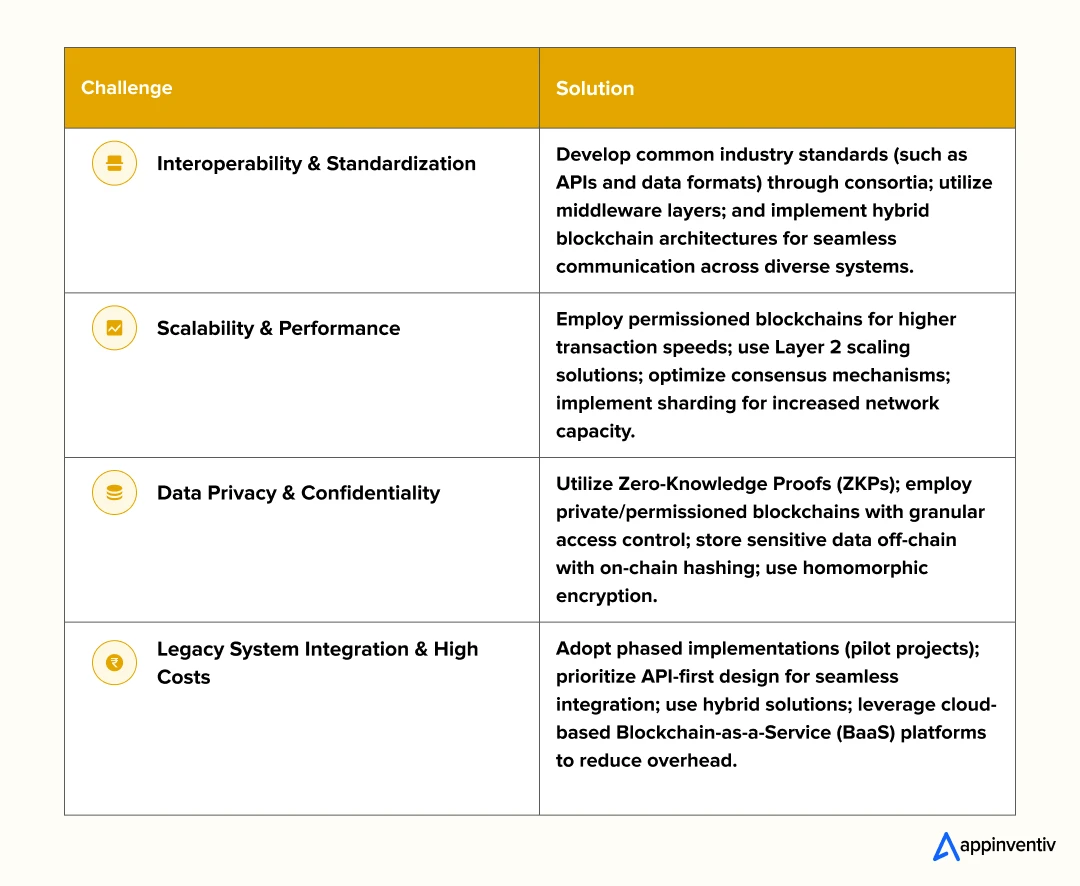
Experience the Revolution of Blockchain in Airlines with Appinventiv
AppInventiv gets both aviation software and blockchain tech really well, so we’re a solid choice for airlines, airports, and other aviation companies wanting to tap into what blockchain can do. Since we know both worlds, we can build stuff that solves the real problems aviation companies deal with instead of just throwing generic blockchain solutions at everything.
Our deep understanding of aviation operations allows us to develop blockchain solutions that seamlessly integrate with existing airline systems and regulatory frameworks. Our experience in aviation software development services ensures that blockchain implementations comply with stringent industry standards, including IATA requirements, FAA regulations, and international safety protocols. This expertise is crucial when developing systems that must meet aviation’s zero-tolerance approach to safety and reliability.
AppInventiv combines serious aviation industry know-how with cutting-edge blockchain development chops to build stuff that tackles the actual headaches airlines and airports deal with daily. We help aviation companies modernize their legacy systems without messing up their day-to-day operations or running into trouble with regulators.
We’ve built a bunch of blockchain apps and aviation software over the years, so our clients end up with solutions that work smoothly from a tech standpoint, make sense for their operations, and meet all the industry requirements. Having hands-on experience in both worlds gives us a leg up when helping aviation companies figure out how to go digital with blockchain technology.
FAQs
Q. What are the regulatory and compliance implications of using blockchain in aviation?
A. The regulatory and compliance landscape for blockchain in aviation is complex, requiring adherence to strict international standards, including IATA guidelines, FAA regulations, and ICAO protocols. While blockchain boosts transparency and auditability, aviation authorities must ensure these systems meet safety standards for critical operations. Data privacy laws, like GDPR, also complicate the use of immutable blockchain records. For blockchain to be successfully integrated, it’s essential to work closely with regulatory bodies, ensuring compliance frameworks evolve alongside technological advancements, so that innovation doesn’t compromise aviation’s focus on safety.
Q. How can blockchain improve the customer experience in air travel?
A. Blockchain significantly enhances the air travel experience by facilitating seamless digital identity verification, thereby eliminating the need for repetitive document checks at various checkpoints. Smart tickets offer seamless access to lounges, hotels, and transportation services with a single token. Real-time, tamper-proof flight updates reduce confusion during delays or cancellations, giving passengers more confidence. Blockchain also enables instant, transparent baggage tracking throughout the journey, and automated smart contracts ensure prompt compensation for disruptions. Furthermore, personalized loyalty programs across airline partnerships become more efficient, offering a smooth, integrated travel experience from booking to arrival.
Q. Which airlines or aviation companies are using blockchain?
A. Several major airlines and aviation companies demonstrate how is blockchain used in aviation through their implementations, though adoption varies across different use cases. Lufthansa has explored blockchain technology for loyalty programs and passenger data management, while Air France-KLM has piloted blockchain systems for tracking maintenance records. Singapore Airlines launched a blockchain-based loyalty program called KrisFlyer, and Boeing has explored blockchain applications for supply chain management and tracking aircraft parts. To understand what is the blockchain technology in airports, consider how facilities like Heathrow and Dubai International have tested blockchain solutions for passenger processing and cargo management, demonstrating growing industry interest in distributed ledger technology.
Q. What is the future outlook for blockchain in the aviation industry?
A. The future outlook for blockchain in aviation appears highly promising, with widespread adoption expected over the next decade as regulatory frameworks mature and interoperability standards develop. Industry experts predict blockchain will be essential for aircraft maintenance tracking, passenger identity management, and supply chain transparency by 2030. New uses are appearing, including autonomous aircraft operations, carbon credit trading, and connected travel systems. As cybersecurity threats increase and the demand for better operational efficiency grows, blockchain’s decentralized structure positions it as vital technology for next-generation aviation infrastructure, enhancing safety, transparency, and passenger experience overall.
Q. What challenges or barriers exist for blockchain adoption in aviation?
A. Blockchain adoption in aviation hits major roadblocks, including expensive implementation, tricky integration with old systems, and slow regulatory approval processes. The industry’s cautious approach to new tech, focused on safety first, delays adoption timelines. Key challenges include scalability problems, high energy use, and making different blockchain platforms work together. There are also obstacles in training workers, meeting data privacy rules, and needing standardized practices industry-wide. Pushback from established companies and unclear return on investment make adopting blockchain across aviation operations even more complex.
Q. What are smart contracts, and how are they used in aviation?
A. Smart contracts are self-running digital agreements with rules written directly into code that execute automatically when certain conditions happen. In aviation, they change operations by automating aircraft lease payments, maintenance scheduling, and fuel buying without middlemen. Airlines use smart contracts for automatic passenger payouts during delays, cargo delivery confirmations, and parts warranty claims. These contracts make MRO services more efficient by releasing payments automatically once work gets verified and processing insurance claims smoothly.
Q. What are the benefits of blockchain for airline payments and settlements?
A. Blockchain transforms airline payments and settlements by allowing instant international transactions without traditional banks, cutting processing times from days to minutes. Smart contracts handle revenue sharing between partner airlines automatically, removing manual reconciliation and disputes. The technology creates transparent, unchangeable transaction records that make auditing and regulatory compliance easier. Blockchain reduces foreign exchange costs and settlement fees while providing real-time payment tracking in complex airline partnerships. It simplifies loyalty point exchanges between airlines and enables instant refund processing, boosting both operational efficiency and customer satisfaction in financial dealings.
Q. How does blockchain help with aircraft parts tracking and maintenance logs?
A. Blockchain creates permanent digital records of every aircraft part from manufacturing to retirement. This lets you track exactly where each component originated and stops counterfeit parts from entering the system. Every maintenance action, inspection, or repair gets automatically logged with details about what was done, when, and by whom – and these records can’t be altered afterward. The system can also schedule maintenance automatically based on flight hours or takeoff-landing cycles. Everyone involved – airlines, manufacturers, regulators – gets instant access to component performance data whenever they need it.


- In just 2 mins you will get a response
- Your idea is 100% protected by our Non Disclosure Agreement.

How Airlines Use Data Analytics for Enhanced Operational Efficiency - 10 Use Cases and Benefits
In today’s competitive airline industry, leveraging data analytics is not just an advantage but a necessity. Airlines face numerous challenges including fluctuating fuel costs, stringent regulatory requirements, and high customer expectations, all of which demand smarter, data-driven decision-making to enhance operational efficiencies and maintain profitability. Data analytics offers powerful solutions by enabling airlines to process…

How Digital Twin Technology is Transforming Airline Operations and Safety
The aviation industry, like other sectors, plays a significant role in the economy of every country. Unfortunately, recent years have posed immense challenges for this industry, particularly in 2020 and 2021 during the COVID-19 crisis. Undoubtedly, the airline segment experienced a drastic downturn and incurred an enormous loss of $168 billion. The aviation sector addressed…
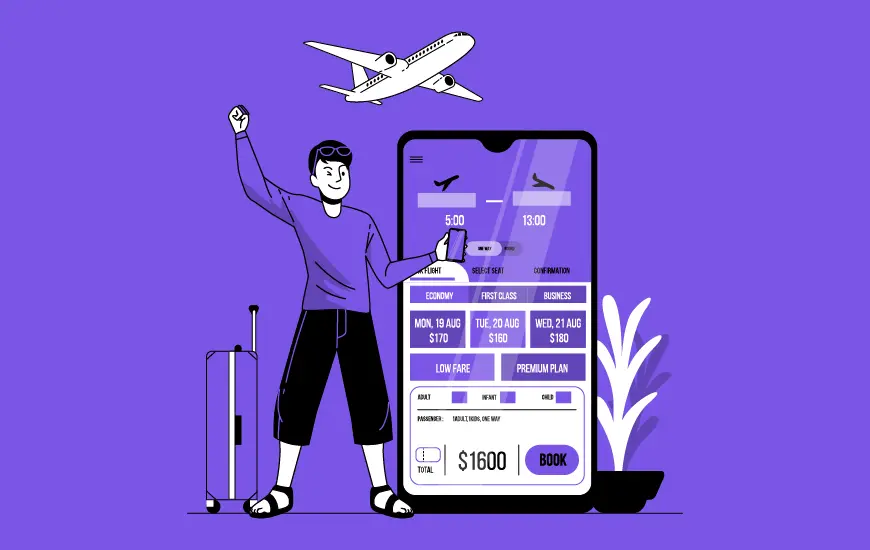
Flight Booking App Development Cost: Everything You Need to Know
As per recent reports, there are approximately 6.6 billion active smartphone users globally, making mobile apps ubiquitous in today's digital ecosystem. The exceptional revenue generated by these mobile apps has made them an important aspect of modern business. Interestingly, flight booking apps are also gaining instant popularity in the travel and tourism industry, whose market…


















